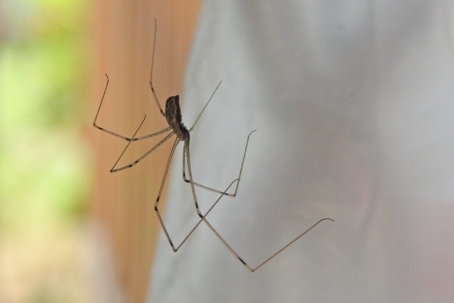Can Cellar Spiders Bite?
Cellar spiders can bite, but they almost never do, and even when they do, the effects are extremely mild. These long-legged spiders are timid, avoid contact, and rely on retreat rather than aggression. They lack the inclination—and the anatomical strength—to deliver a meaningful bite to people or pets.
Do Cellar Spiders Bite?
Bites from cellar spiders are exceedingly uncommon, and when they do happen, they almost always stem from accidental contact rather than any kind of defensive intent. These spiders are naturally skittish and prefer fleeing, dropping from their web, or “vibrating” in place instead of biting. Still, there are a few situations where a bite becomes slightly more plausible:
- When they are trapped against skin: The most realistic scenario is accidental compression—such as grabbing one while cleaning, pressing one against your body while reaching into storage, or rolling onto one in bed. When they feel physically trapped, they may attempt a small defensive nip.
- When someone handles them directly: Cellar spiders don’t tolerate handling well. Picking one up, pinning it between fingers, or attempting to relocate it by hand increases the likelihood of a bite simply because the spider feels confined.
- When a pet disturbs a web at very close range: Even here, cellar spiders almost always flee. But a curious cat or dog poking a web with its nose could trigger a brief defensive reaction if the spider is cornered and sees no escape route.
- When they’re guarding eggs or freshly hatched spiderlings: Cellar spiders show only mild maternal behavior, but females may stay close to their egg sac. If someone accidentally presses too close, a defensive response—even a bite—is slightly more likely.
Even in these situations, cellar spider bites are rare, mild, and medically insignificant. They typically result in nothing more than a small, short-lived irritation and don’t pose any danger to people or pets.
Are Cellar Spiders Venomous?
Yes, cellar spiders (family Pholcidae) are technically venomous in that they possess venom glands and use them to subdue their prey, which usually consists of small insects and other arthropods. Their venom is specialized for this purpose and is extremely weak in relation to humans.
Cellar Spider Venom
Cellar spider venom is a mild neurotoxic venom primarily adapted to immobilize small arthropod prey, such as insects and other spiders. Its composition includes enzymes and proteins that disrupt the nervous system of their prey, causing paralysis and making it easier for the spider to consume them.
In humans, however, the venom is extremely weak and has no significant toxic effect. The spider’s fangs are small and often cannot penetrate human skin deeply enough to deliver venom in any meaningful amount. Even if a bite occurs, the reaction is usually limited to minor redness, slight swelling, or temporary irritation, with no systemic effects.
Essentially, cellar spider venom is potent only in the context of their natural prey; it is biologically ineffective against larger animals, including humans and most pets.
Cellar Spider Bites
The risks associated with cellar spider bites are minimal to the point of being virtually nonexistent. Their fangs are small, their musculature is weak, and their venom is not medically significant for humans or pets. In the rare case a bite does occur, the effects are usually limited to a tiny red spot, mild itching, or slight irritation that fades quickly. There is no risk of necrosis, systemic symptoms, allergic reactions beyond what you might see from a minor insect bite, or any long-term complications. Most “symptoms” people attribute to cellar spiders are actually caused by other insects or environmental irritation rather than the spider itself. As a whole, cellar spiders are harmless, low-risk household spiders that pose no real health threat.
What Do Cellar Spider Bites Look Like?
A true cellar spider bite is extremely subtle and often indistinguishable from a minor skin irritation. When a bite does occur—which is rare—it typically appears as:
A tiny, pinpoint-sized red spot at the site of contact.
Very mild redness surrounding the spot, usually no larger than a pea.
Minimal itching or tenderness, if any.
No swelling, blistering, or spreading reaction.
Because their fangs are small and their venom is weak, a cellar spider bite doesn’t produce dramatic symptoms. Many people never notice it at all, and when they do, it often resembles a mild mosquito bite or light scratch more than anything associated with a venomous spider.
What To Do About Cellar Spider Bites
If you are bitten by a cellar spider, there’s no need for medical intervention in nearly all cases. The bite is mild and self-limiting. Recommended steps are:
Clean the area: Wash the bite gently with soap and water to reduce the risk of secondary infection.
Apply a cold compress: This can help reduce any minor redness, swelling, or itching.
Use over-the-counter remedies if needed: A mild hydrocortisone cream or an antihistamine can relieve itching or irritation.
Monitor for unusual reactions: While extremely unlikely, watch for signs of infection (increasing redness, warmth, or pus) or an allergic reaction (severe swelling, hives, or difficulty breathing). If any of these occur, seek medical attention promptly.
In virtually all cases, no further treatment is necessary, and symptoms resolve within a few hours to a couple of days. Cellar spider bites are largely harmless and don’t pose any systemic health risk.

